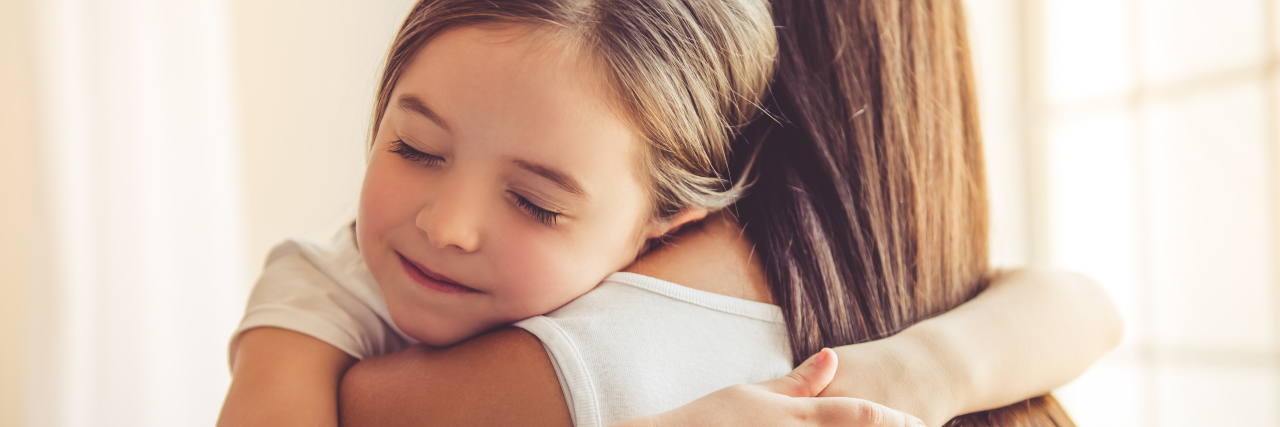The other day my six-year-old daughter and I were sitting on the front steps coloring. She looked up at me out of nowhere and asked, “Mom, is being a parent hard work? Because it looks like hard work.” I responded truthfully that yes, it was very hard work. Then my little girl gave me a contemplative look and said, “Well I don’t think I want to have kids.” This broke my heart a little bit. She has always said since she was two that she wanted to be a mom, and a baby doctor when she grew up. Maybe it has just been a long summer, but I started to pile the mom guilt on.
I’ve been battling who knows what — extra exhaustion from joint hyper mobility, extreme anxiety, lots of GI issues related to celiac disease and who knows what else. I’ve felt rotten this summer and parenting has been extra hard. Apparently so hard and so joyless that my daughter has spent some time reevaluating her personal dreams. It has made me really step back and take a look at myself. I know my own personal capabilities — a morning at the park with the kids or an afternoon swimming wipes me out for the whole day, sometimes for multiple days. So how do I be a successful parent when I’m having a hard time even functioning as a human being? As I’ve been thinking about my situation, I’ve realized several things that have helped to lessen that mom guilt.
- I do not need to feel guilty for the way my body functions. There is a certain amount of my physical symptoms that are within my control, and a good number that are outside of my control. Even those symptoms that are within my control take a long time and lots of work to see positive change. If I’m having a bad day, week, month, or year and am realistically only able to do the bare minimum, that is a reality that needs to be faced and accepted. Extra energy shouldn’t be spent on guilt.
- Prioritizing needs over wants is essential. My youngest child has severe eosinophilic esophagitis and is being treated with an elimination diet. Additionally, my oldest son and I have celiac disease and we can’t realistically eat out or even accept meals made from well-meaning friends. This means a lot of my “get up and go” energy is spent in the kitchen. I have to cook every meal and every snack from scratch, and often I cook multiple dinners to accommodate different dietary needs. The planning, shopping, cooking and washing up afterward takes up a good portion of my time and my energy. So when my daughter is begging to go to a park, or to the swimming pool I almost always say no. I don’t have the ability to spend that energy in that way right now very often. It is hard, but it again is the reality of our situation right now and is not something I should feel guilt over.
- Let it go and ask for help. As a self-proclaimed perfectionist letting things go is the hardest thing I have to do. Sometimes (most of the time) the laundry isn’t folded, the beds aren’t made, the dishes aren’t always done, the garden isn’t weeded, the lawn isn’t mowed. I have a friend who has come over to help me fold laundry. My initial reaction when she offered to help in this way was one of guilt and embarrassment, because I wasn’t capable of doing everything. But then I realized that that is why I have a community of friends and family. We are here to support each other ,and when help is offered accepting with gratitude and graciousness is OK. It’s OK to recognize our limitations, ask for help when needed and most importantly it is OK to turn off the guilt.
- Your family isn’t going to look like everyone else’s and that’s OK. The most guilt consuming thing you can do is compare your situation with the situation of another family. I went to an activity for my church where several moms were presenting ideas on what to do with your kids in the summer time. Five minutes in I started bathing in that mom guilt again. I couldn’t imagine having nerf gun wars, hiking every weekend, playing all sorts of water games, or going on long family vacations. When I got home I felt like crying because I just knew my kids were getting an activity deficient childhood. And then I had a thought — I love my children fiercely. I’m their advocate, their school tutor, their chef and their number one cheerleader. Our family will never look the same as someone else’s because of our medical issues, but that will never change the amount of love that is in our home. At the end of the day that love is what your children are going to carry with them through adulthood. They will remember less the specifics and more that all those things we did for them through pain and tears and illness meant that we loved them. And that is all that really matters.
Photo credit: vadimguzhva/Getty Images

